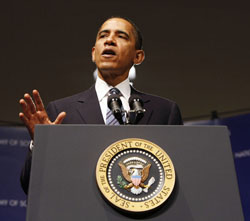By Najee Ellerbe
UJW
WASHINGTON — The election of President Barack Obama is fueling a discussion among young African-American men about whether racism is dead in the United States.
No question, Obama’s election has been a source of pride and inspiration for people of color across the country and around the world. Many people have said it is a happening they never thought they’d see in their lifetime.
Some people, however, are pointing to Obama’s rise to the White House as proof that the United States has become a color-blind society. Others say that while the election is historic, it is but one positive milestone in this country in the wake of nearly 400 years of discrimination against black people.
I feel like we have reached equality,” said Raashard Latta, a 16-year-old junior at McKinley Tech High School. “A black man became president, that’s the highest position in the land. I never thought it would happen but it did.”
Lloyd Mann, 17, said that while he’s proud of the president, he doesn’t believe that racism has disappeared. He said the United States still has lots of work to do.
“There is no difference. Just because Obama is in office doesn’t mean a lot,” he said. “He’s just the start.”
The numbers appear to back him up.
According to the National Urban League’s The State of Black America 2007, “African-American men are more than twice as likely to be unemployed as white males and make only 75 percent as much a year.
Also U.S. Census Bureau Data from August 2008 shows the black poverty rate is still three times that of whites. The median income for black families was $33,916 in 2007 compared with $54,920 for whites. Blacks are six times more likely than whites to go to jail and receive longer sentences for the same crimes, the Census report said.
“I don’t think it will never change. It’s going to take more than one black man to change things,” said Mann, who is planning to go to Syracuse University to study communications. “Other races — mainly whites — still look at young black men the same way … as if we are troublesome kids.”
But Latta said he has new confidence in the wake of Obama’s election that he can get into college.
He said he’s considering applying to Norfolk State, Morehouse, Syracuse, North Carolina Central and Hampton – all Historically Black Colleges and Universities (HBCUs).
“I know I can do what I want to do now,” he said.


